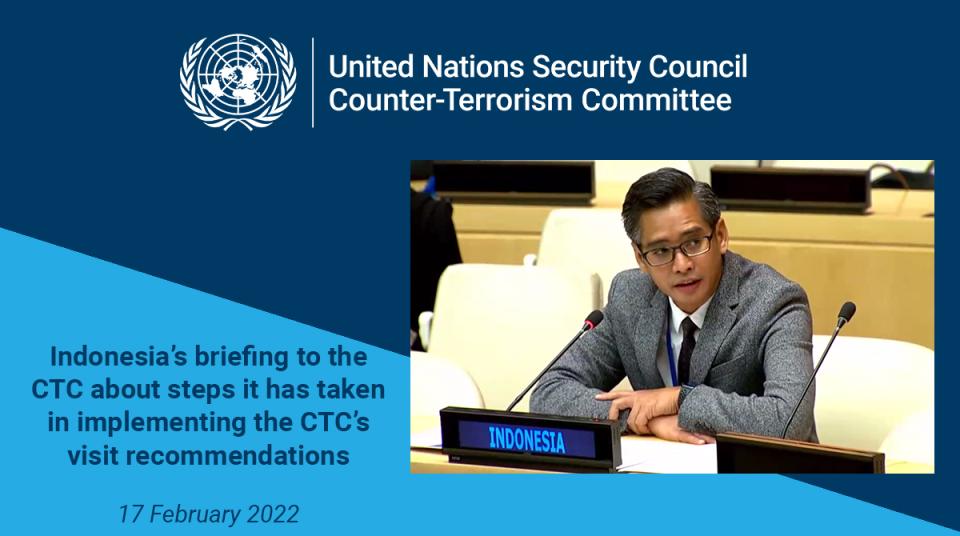
On 17 February 2022, pursuant to Security Council resolutions 2395 (2017) and 2617 (2021), the Republic of Indonesia briefed the Counter-Terrorism Committee on its efforts to counter terrorism since the Committee’s follow-up assessment visit, conducted in July 2019.
Mr. Andhika Chrisnayudhanto, Deputy for International Cooperation of Indonesia’s National Counter-Terrorism Agency (BNPT), informed the Committee that Indonesia’s terrorism landscape had recently changed.
In 2021, the number of acts of terrorism in Indonesia had declined by 53 per cent. There had been only two terrorist attacks, and 330 terrorists had been apprehended by Densus 88 (the special counter-terrorism police unit), mostly for preparatory terrorist acts. However, Indonesia remained a source, transit point, and destination for ISIL fighters, as well as for militants connected to, inter alia, Al-Qaida, Jemaah Islamiyah, and Jemaah Ansharut Daulah (JAD).
The major terrorism trends included: (i) suicide bombings were a frequently used method of attack; (ii) women had become more actively engaged; and (iii) online radicalization had increased.
Indonesia had been undertaking a global initiative on preventing and countering violent extremism leading to terrorism (P/CVE). It had also amended the Law on Counter-Terrorism in 2018 to ensure its compliance with recently adopted Council resolutions.
The new Law had also strengthened the powers of the BNPT to take a strong lead and coordinate all counter-terrorism matters among all relevant stakeholders.
Indonesia emphasized the importance of adopting a “soft approach” and the involvement of civil society, and believed that “strengthening society resilience” was key to countering terrorism and violent extremism conducive to terrorism.
As the Islamic State in Iraq and the Levant (ISIL) also known as Daesh, rose to prominence and then suffered territorial defeat between 2014 and 2019, the ISIL-associated Jemaah Ansharut Daulah (JAD) emerged. More than 600 Indonesian foreign terrorist fighters (FTFs) travelled to the conflict zones of the Middle East, and more than 400 returnees and deportees subsequently returned to Indonesia, posing a significant security threat.
Many terrorist prisoners are expected to complete their sentences and be released back into society. Consequently, Indonesia has also been closely engaged in the rehabilitation and reintegration of terrorists and violent extremists.
During the briefing, the BNPT reaffirmed its strong commitment to cooperating with United Nations entities and other Member States to combat terrorism.
Acting on behalf of the Committee, the Counter-Terrorism Committee Executive Directorate (CTED) conducted a comprehensive assessment visit to Indonesia 15 years ago, following a series of deadly suicide bombings which included two bombings in Bali, at the Marriott Hotel and the Australian Embassy, respectively, committed by Jemaah Islamiyah.
CTED, acting in cooperation with the Government of Indonesia, the United Nations Office on Drugs and Crime (UNODC), and the United Nations Office of Counter-Terrorism (UNOCT), has been working on a ground-breaking project, pursuant to its 2019 visit, to develop the capacity of Indonesia’s correctional, probation and parole officials in the areas of rehabilitation and reintegration and thereby develop good practices that can be made available to other States.
In July 2019, CTED visited Jakarta to conduct a follow-up assessment, making 62 recommendations for enhancing its implementation of the relevant Council resolutions.
The Under-Secretary-General of UNOCT and the CTED Executive Director also conducted a joint-high-level consultation to the country in February 2020 to help promote effective implementation of the 62 recommendations.

